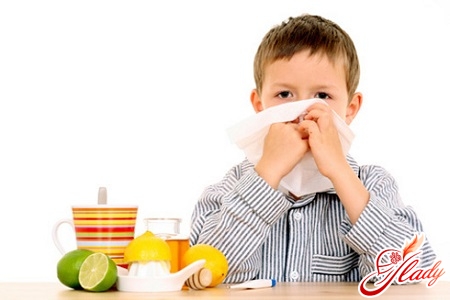
The ability of any organism to resistvarious bacteria is called immunity. It is very important for any mother that her child's immunity is very strong. Only a strong immune system can withstand attacks from various bacteria and infections. Now there are a huge number of drugs and medications that can increase the immunity of not only an adult, but also a small child. But in addition to these drugs, you need to monitor the conditions in which your child lives, his diet and lifestyle. So, how to increase immunity in a child? What factors should be taken into account and what should be done? In general, there are several types of immunity. One of the types is the so-called specific immunity. Only after a person has had any disease (rubella, chickenpox), this type of immunity is developed. By the way, depending on the severity of the disease, immunity can last for the rest of life, or for a certain period of time. Even while the child is in the womb, so-called non-specific immunity is formed, which is innate. In addition to these types, immunologists divide all types of immunity into natural (established only through the body's efforts when in contact with the pathogen) and artificial, which appears after vaccination. There is also antimicrobial immunity. It fights any pathogen and ultimately destroys it. Antitoxic immunity resists toxic waste products and the decomposition of already dead pathogens.

Features of the immunity of the child
There are many reasons whythe child's immunity may decrease, and the child will be vulnerable to any disease. Among such reasons are improper nutrition, lack of necessary vitamins, stressful situations, poor living conditions, as well as various chronic diseases of internal organs. Immunity can be easily stimulated. For this, pediatricians strongly recommend that mothers harden their children from an early age. The hardening procedure is very useful for children, it improves not only the immunity, but also the mood of the baby. Particular attention should be paid to the child's nutrition. It should be balanced. The baby should receive all the necessary nutrients and vitamins. In the autumn-winter period, when the body is most vulnerable to all diseases, it is worth giving the child a variety of multivitamins and immunostimulating drugs. Immunity in a child, like in an adult, has its own distinctive features. Thus, the child's body is more vulnerable to all infectious and viral diseases than the body of an adult. In the first months of the baby's life, all the vitamins he needs enter the body with mother's milk, which contains so many immunoglobulins. That is why pediatricians recommend breastfeeding a child at least until 7-8 months. While the child is in the womb, the body's resistance to various infections is promoted by immunoglobulin class G, which enters the child's body with the mother's blood. Immunoglobulin G accumulates in the child's body during the entire time of its stay in the womb. After the child is born, this immunoglobulin begins to be used up. It is enough for about 6 months. That is why, as a rule, children begin to get sick at the age of over six months. The child's body begins to produce its own immunoglobulins no earlier than 6 years, and by the end of puberty, the immune system can be considered fully formed. Any child attending kindergarten, and then school, is faced with various infectious diseases. In any educational institution, vaccination of children against certain diseases is mandatory. But it is non-specific immunity that develops the body's ability to resist various forms of influenza, acute respiratory viral infections, bronchitis, tonsillitis, laryngitis, etc.
Factors affecting the strength of the child's immunity
It is not uncommon to encounter a situation wherewhen one child can run barefoot through puddles all day long and not get sick, while another child gets sick at the slightest breeze or dampness. This only means that some children have a much stronger non-specific immunity than others. Of course, vaccination against some diseases is a great thing. Thanks to it, children become immune to diseases such as measles, chickenpox, diphtheria, whooping cough, some forms of hepatitis, etc. However, vaccination is in no way able to increase your child's non-specific immunity. After all, we all understand perfectly well that a child can have a full package of vaccinations, but suffer from tonsillitis, bronchitis, otitis and other diseases every month. This is due only to the fact that such diseases are caused by microorganisms that are not vaccinated against. There are several main factors that somehow affect the non-specific immunity of children. So, some of these factors are the child's living conditions and the arrangement of his life. Low financial status of parents, too frequent change of residence - all this can affect the child's immunity and lower it. No less important is the psycho-emotional state of the child. It can be affected by an unfavorable atmosphere at school, kindergarten or at home. Constant clarification of relations in front of children, frequent drinking of parents, insults from peers - all this most directly affects the body's resistance to all kinds of bacteria. Love of loved ones, care and affection - this is exactly what any child needs.
A few more tips
Proper nutrition plays a huge role inmaintaining a healthy immune system. The child's daily diet should include food containing all the necessary vitamins, nutrients and minerals. It is important to remember that the diet must be balanced. It must include products of plant and animal origin. Fruits and vegetables must be present in the daily diet. Some children are born with certain diseases, while others acquire them early in life. If at least one organ of the child is affected by a disease, the immune system can no longer function normally and correctly. Often, a child's immunity is weakened due to diseases such as gastritis, pyelonephritis, intestinal dysbacteriosis, biliary dyskinesia, etc. If your child has a cold more than six times a year, and the diseases occur with certain complications (tonsillitis, pneumonia), we can conclude that his immunity is weakened and is not able to resist infections and viruses. If you notice that your child is very often ill, first of all you should consult an immunologist or a pediatrician. In order to avoid complications and consequences, you should never treat the child yourself.
Ways to improve immunity
As mentioned above, the main methodsподдержать иммунитет ребенка — это закаливание, сбалансированное питание, а также употребление различных препаратов, назначенных лечащим врачом (иммуностимулирующих). Закаливание как средство повышения иммунитета Процедуру закаливания рекомендуется проводить не раньше чем с трех лет. Но существуют и исключения. Если ваш ребенок родился абсолютно здоровым, закаливание можно начинать хоть на первом году его жизни. Процесс должен быть постепенным. Для начала достаточно растирать тело малыша влажным полотенцем или губкой. Можно также пред сном обливать ножки ребенка прохладной водой, при этом постепенно снижая температуру воды (каждый день на градус). Закаливание ребенка более старшего возраста должно быть представлено в виде игры, чтобы ему было интересно. Например, можно проводить ежедневную утреннюю гимнастику сразу после пробуждения вашего ребенка. Достаточно в течение 10-15 минут проводить различные несложные упражнения, которые ребенок без труда сможет повторить. Помещение, где будут проводиться подобные занятия, должно быть хорошо проветренным. После этого можно приступить к следующему этапу — растиранию рук, ног и всего тела мокрой губкой. Температура воды должна быть 22-25 градусов. Со временем ее можно уменьшить до 18 градусов. После того как процедура закончена, ребенка необходимо вытереть насухо и надеть на него теплую одежду. Сбалансированное питание Каждому человеку, а особенно ребенку, необходимо ежедневно получать определенное количество витаминов и минералов. Все важные витамины можно получить, употребляя в пищу правильные продукты. Так, витамин A содержится в морской рыбе, печени, моркови, молоке, яичном желтке, масле, сливках, капусте и зелени. Помимо того что данный витамин считается лучшим средством в борьбе с болезнями, он еще и улучшает зрение, питает кожу и прекрасно помогает при аллергии. Витамин A способен ускорить реакцию нервной системы вашего ребенка. Получить витамин C можно, употребляя в пищу свежую и квашеную капусту, цитрусовые, шиповник, черную смородину и т. д. Витамин C с легкостью может справиться с простудными заболеваниями. Употребление его на ранних стадиях болезни не допустит перехода кашля и насморка в хроническую стадию. Витамином E богаты шпинат, листы салата, растительное масло, цельнозерновой хлеб, капуста брокколи, пророщенная пшеница и др. Данный витамин обладает хорошим противовирусным действием. Он способен разрушить вещества, которые отравляют клетки иммунной системы вашего ребенка. Необходимые витамины группы B содержатся в свекле, бобовых, гречке, зеленом горошке, твороге, овсянке, икре, говядине, томатах и т. д. Витамин B1 восстановит нервную систему малыша, избавит его от постоянных капризов, слабости и головной боли. А это, как известно, очень сильно влияет на детский иммунитет. Недостаток витамина B2 заметно влияет на иммунитет. При его недостатке могут появиться болезни желудочно-кишечного тракта. Фолиевая кислота (витамин B9 и B12) участвует в образовании иммунных клеток (лимфоцитов). Витамин D, который тоже необходим организму, содержится в морской рыбе и коровьем молоке или же в рыбьем жире, который можно приобрести в любой аптеке. Помимо того что витамин D отвечает за свертываемость крови и работу сердца, он еще и регулирует нервную и иммунную системы малыша. Для поддержания крепкого иммунитета организму требуются калий, магний, медь, цинк, селен, йод и другие минеральные вещества. Необходимый организму калий входит в состав редиса, бобовых, огурцов, изюма, печеного картофеля, чернослива. Магнием богаты грецкие орехи, тыква, креветки, соя, моллюски, зелень и горох. В фундуке, овсе, гречке, сладком перце, землянике, помидорах содержится медь. Помимо этого, грецкие орехи, фундук, пшеничные отруби, семечки подсолнуха богаты цинком. Необходимый организму йод можно получить, употребляя в пищу морскую капусту, рыбу, морепродукты, грибы, лук, зеленый горошек и т. д. В рацион любого ребенка должны быть включены продукты, содержащие достаточное количество белка. Белок содержится в мясе, фасоли, молочных продуктах, горохе, бобах. Поливитаминные препараты для иммунитета Детский возраст — это как раз тот период, когда организм стремительно растет. Растут внутренние органы и кости, организм полностью формируется, и именно поэтому ребенку требуется гораздо больше витаминов, нежели взрослому человеку. Дети наиболее подвержены авитаминозу, чем их родители. А это может привести и к стойкому иммунодефициту. В настоящее время в любой аптеке можно приобрести любые необходимые препараты, которые бы помогли укрепить иммунитет вашего ребенка. Выбор поливитаминов сейчас очень большой, причем производители могут быть как российские, так и зарубежные. В выборе препарата для ребенка стоит проконсультироваться со специалистом, который подберет наиболее подходящие для малыша витамины. Организм ребенка особо нуждается в потреблении витаминов весной и зимой. Ведь это именно тот период, когда вероятность заболеть очень высока. Происходит это потому, что нет тех источников витаминов, которые были так доступны летом и осенью. О натуральных фруктах и овощах на время приходится забыть, а ведь именно они являются источниками многих необходимых организму элементов. Иммуностимулирующие препараты В наше время существует огромное количество препаратов, которые могут помочь укрепить иммунитет и улучшить способность организма противостоять различным бактериям и вирусам. Выбор таких препаратов достаточно большой. В любой аптеке вам могут предложить такие препараты, как циклоферон, анаферон, интерферон, эхинацею, виферон, иммунал, ИРС-19 и многие другие. Интерферон относится к биоактивным веществам. Он способен блокировать развитие вирусных инфекций в организме и считается отличным средством профилактики ОРВИ у детей. Анаферон и циклоферон относятся к индукторам. Они способствуют самостоятельной выработке организмом интерферона. Очень часто врачи назначают данные препараты при первых симптомах вирусных заболеваний, для облегчения протекания болезни и гарантии скорейшего выздоровления. ИРС-19, бронхо-мунал и имудан относятся к бактериальным препаратам для повышения иммунитета. Они содержат очень маленькие дозы стрептококка, пневмококка, стафилококка и других возбудителей вирусных заболеваний. Никакой опасности для организма они не предоставляют, при этом способны значительно поднять иммунитет ребенка. Хорошим иммуностимулирующим действием обладают препараты женьшеня, эхинацея, лимонник китайский и другие. Наиболее актуально их потребление в осенне-зимний период, когда организм наиболее уязвим к инфекциям. Именно в этот момент бывают эпидемии гриппа и ОРВИ.
Let's sum up the results
In addition to the listed drugs, there are alsomany others. When choosing a drug, be sure to consult with your doctor. It is possible to boost immunity with folk remedies. Honey, lemon, cranberry, garlic, ginger, onion and other products are considered very useful. But not every child will like this method of treatment, so you need to take into account his age and preferences. It is very important for any mother that her baby is always healthy. A child's good mood is the main indicator of the baby's health. So, what should every mother know? Firstly, she should clearly understand that immunotherapy is very important, and it should in no case become a reason for experiments on her own children. Trust the specialists who will not only help cure your child, but also advise the right means to strengthen his immunity. Health to you and your children.








